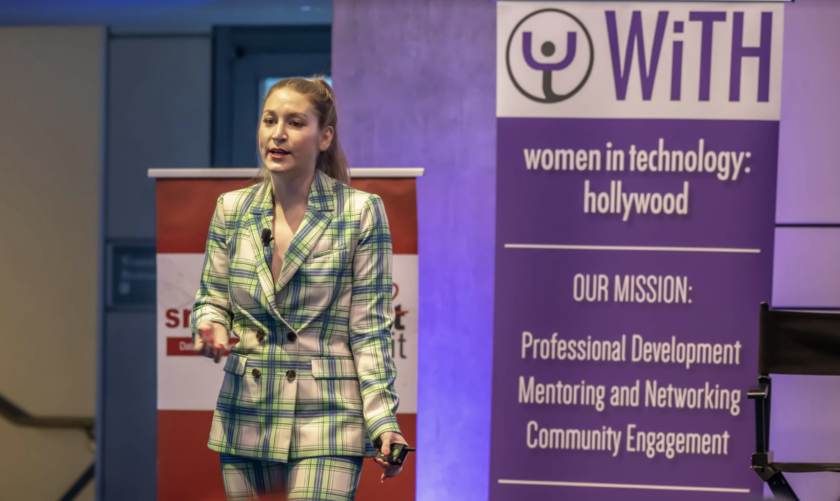M+E Connections

WiTH @ Smart Keynote: Time to End Pattern Matching in the Entertainment Sector
Story Highlights
Despite women statistically yielding higher returns when it comes to Hollywood movies, it would be a great idea to start following the money and ending pattern matching when it comes to judging whose projects to fund in the entertainment sector, according to a keynoter during the Women in Technology: Hollywood (WiTH) held at the Smart Content Summit on March 4 in Los Angeles.
After leaving Endemol USA, Denise Hewett started an entertainment tech company that mitigates the fear and risk around investing in inclusion. Her experience developing and raising funding inspired her to look closely at trends in investing and entertainment to understand the systemic limitations that prevent female founders from succeeding.
“There’s a direct correlation between what we see on the screen, how we perceive ourselves and what we believe we can be,” Hewett told attendees during her keynote session, “The Problem with Pattern Matching.” “I’ve seen firsthand how entertainment moves people — how it deepens empathy, and the data has always supported inclusion,” she said.
Although “the money has always pointed towards inclusion,” she said she wanted to build tools to bridge that shift, she told attendees.
Back about five years ago, the industry was still not ready to admit that the lack of inclusion was a problem, she said, recalling that the head of a production company told her she could affect any change in the industry. The former head of a studio, meanwhile, told her back then there was no problem with inclusion for her to solve and, if you have a great screenplay, it will get made no matter who the writer is, she recalled.
Hewett spent the past five years “bootstrapping my business, building multiple products to reverse engineer the ways we can mitigate the risk and the fear around investing in inclusion, and I’ve done it all for less than half of a million dollars,” she told attendees.
Her company’s first product has grown to now have 7,000-plus users and it’s had 15 films optioned to date, she said, noting the first film, “Hope Springs Eternal,” was distributed on Netflix last summer.
She set out to start a seed funding round, thinking then that it would be different that time because “we had traction, we had users… we had a clear innovation on an outdated format, and the timing was finally right,” she recalled.
She wound up meeting with 300 investors over seven months and 50 of them said she was a “brilliant entrepreneur” and could not believe what she was able to accomplish already with such a small amount of funding…. but they were still passing on the opportunity, she said.
In 2016, only 4.4% of venture capital went to women and that declined to 2% in 2017, then “remained steady in 2018 and, last year,” it increased to a “whopping” 2.8%, she said. “So, despite this perceived cultural movement towards inclusion, the reality is we’re not moving the needle” yet, she noted.
“Just to really demonstrate the inequity in this space, there are only 34 women of color in the history of venture who have raised a million dollars,” she said. However, the number of women of color seeking funding has been growing, she noted, adding that indicates “there’s not a pipeline problem,” but rather a different issue at play.
She explained: “I don’t fit the pattern. My company does not fit the pattern. And the problem with pattern matching is that it upholds exclusionary practices because if historically these industries have only been open to one type of person, then the pattern and the data is always going to support that. And no diversity initiative is going to make a dent…. Innovation does not come from things we’ve seen before. Innovation does not follow a pattern.”
A study found that entrepreneurs and venture capitalists “intellectually knew they should not follow the crowd, but they did it anyways, and long-term those VCs suffered,” she said. On the other hand, “entrepreneurs who walked into perceived high-risk industries had scrutinized the market more deeply and, therefore, they fared better,” she said.
“If we continue to invest in a pattern, we will never reach true innovation,” she warned.
Therefore, she argued: “The time is not now to invest in the pattern. The pattern has caused the implosion. The time is now to look at perceived risk as the way to reward.”
Despite the obstacles she has faced, Hewett told attendees: “I don’t really believe in failure. I think failure is an awesome growth mechanism…. What’s been frustrating for me is that I haven’t really had the opportunity to see if what I’m building will fail.”
“We’re at a critical time in the future of our industries,” she told attendees. “We need to look at perceived risk as our way forward. It will not only build us a more inclusive future, but a more profitable one,” she said.
Her message to Hollywood and investors: “I am asking you to give women the fair attention they deserve when they start something, when they invent something, when they imagine something — and I’m asking you to allow women to fail big because you know from today we’re more likely to win big.”









